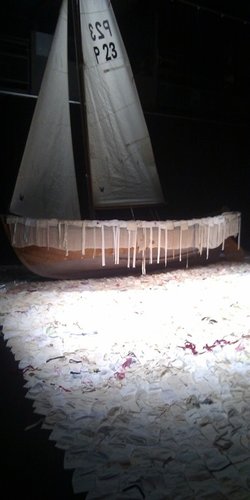- About Us
- Columns
- Letters
- Cartoons
- The Udder Limits
- Archives
- Ezy Reading Archive
- 2024 Cud Archives
- 2023 Cud Archives
- 2022 Cud Archives
- 2021 Cud Archives
- 2020 Cud Archives
- 2015-2019
- 2010-2014
- 2004-2009
 |
On 'Roses From the Heart', Christina Henri |
It is amazing how an interest in folk music makes you feel part of the currents of Australian history. In late 2015 I received a great surprise when a woman contacted me by email from Devon. She had learned of my existence because of a paper I had given at the National Library of Australia just before Easter 2014. The paper ‘We Were On the Cornwallis: An Exercise in Tracing the Provenance of Folk Tunes’ was posted on the website of the Australian Folklore network.

The paper discussed my search for a tune to which I might set the words of a song about one pair of my great great great great grandparents. Mariner William Eckford -a Scot aged over 40- and 16 year old convict girl Mary Horrell met on the Cornwallis during its voyage to Australia 1800-1801. Mary was one of over 25,000 women sentenced to transportation between 1788 and 1853.
Susan Wild explained that she was trying to find out more about Mary. She had a personal interest in Mary since making a ‘bonnet’ for her in a project co-ordinated by Hobart conceptual artist Christina Henri. My correspondent had found a deal of information about Mary who was apparently from Shobrooke in Devon. I was touched by Susan’s compassion and care for my ancestor. I put my reaction in the song ‘A Bonnet for Mary’ which can be heard on my SoundCloud page here. Susan’s photograph of the bonnet is also there.
Henri gathered the bonnets and placed them into a boat about the size of a lifeboat. The installation has travelled widely and been the centrepiece of several exhibitions. As another feature of the project, Henri produced a CD of songs about female convicts from around Australia and the source countries.

The CD is called Roses from the Heart. Some songs are from the original artists including Bernard Carney, Margret Roadknight, Nerys Evans and Judy Small. Others, such as Pete St John’s ‘Fields of Athenry’ are performed by local musicians. Of the sixteen tracks a few were written especially for the project.
Readers curious about the music of Devon should consult ‘Wren Music’ and the collections of the Rev. Sabine Baring-Gould. When I expressed an interest in knowing how my ancestor might have spoken, a friend directed me to a recording of two elderly women from the area in conversation which can be found here.
Perhaps another CD to tie in with the history of the period could be a collection of songs that the female convicts themselves might have sung. These could be children’s songs from the main source countries of Ireland, England and Scotland. In the days before ‘pop’ songs, these were likely to be skipping rhymes, lullabies, hymns and customary songs of seasons such as harvests. It is likely that some of those women transported passed on their songs to their children, thus preserving them for future musicologists. Christina Henri’s project performs an important service for a country still trying to appreciate – and admit - the extent of convict influence in 21st century society.
A former academic, Tony Smith has written extensively on a wide range of subjects as diverse as folk music and foreign policy issues in the Australian Review of Public Affairs, the Journal of Australian Studies Review of Books, Overland, the Australian Quarterly, Eureka Street, Online Opinion and Unleashed.
